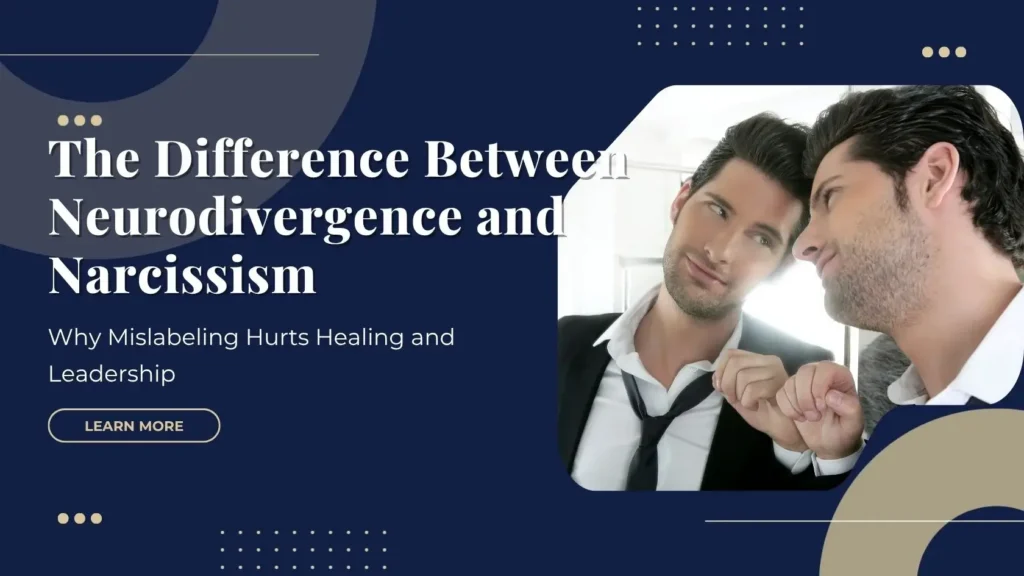In today’s world of quick labels and armchair diagnostics, few topics are more misunderstood than the difference between neurodivergence and narcissism. Both can involve emotional intensity, communication challenges, or self-focus — but they come from entirely different origins.
When leaders, therapists, or organizations conflate the two, they risk missing what’s really happening beneath the surface — and in doing so, they fail to foster real healing, connection, and growth.
Neurodivergence: A Difference in Wiring, Not a Disorder
Neurodivergence refers to variations in how the brain processes, regulates, and responds to information. Conditions such as ADHD, autism, and dyslexia fall under this umbrella — not as pathologies, but as neurological differences (Lai et al., 2014; APA, 2023).
These individuals often:
-
Experience emotions and sensory input more intensely
-
Communicate with honesty and directness that can be misread as bluntness
-
Struggle with overstimulation or executive function under stress
-
Thrive in creativity, innovation, and pattern recognition when psychologically safe
In leadership, neurodivergent individuals often bring original thinking, empathy, and hyperfocus — yet they’re frequently mislabeled as “unempathetic” or “self-absorbed” due to differences in social communication.
Narcissism: A Defense, Not a Neurotype
Narcissism, by contrast, is not neurological — it’s relational and psychological. It forms as an adaptive defense mechanism when a child learns that love or safety is conditional — contingent on performance, image, or control.
Research shows that narcissistic traits often develop through:
-
Over-praise or under-praise, leading to ego inflation or shame (Brummelman et al., 2015, PNAS)
-
Emotional neglect, where authentic needs were ignored (Kernberg, 1975)
-
Parentification, where the child became responsible for managing others’ emotions (Pincus & Lukowitsky, 2010)
In adulthood, this can manifest as entitlement, manipulation, or an excessive need for admiration — behaviors designed to guard a fragile sense of self.
Why the Confusion Happens
Many neurodivergent behaviors can look narcissistic on the surface:
-
Struggles with emotional reciprocity → seen as lack of empathy
-
Intense focus on personal interests → perceived as self-centered
-
Difficulty reading cues → mistaken for emotional indifference
Yet the underlying motives are opposite:
The neurodivergent person seeks regulation.
The narcissistic person seeks validation.
One stems from neurology, the other from defense.
Gender, Socialization, and the Patriarchal Factor
Women and Misdiagnosis
Women are socialized to be caregivers and people-pleasers, not self-promoters. As a result, when women appear assertive, direct, or emotionally overwhelmed, they’re often misdiagnosed as narcissistic — when in truth, they may be emotionally dysregulated due to trauma or survival responses (Sansone & Sansone, 2011; Russ et al., 2008).
These women are not grandiose — they’re guarded, navigating a lifetime of conditioning to suppress needs and maintain harmony.
Men and Patriarchal Conditioning
Men, on the other hand, are more likely to develop narcissistic defenses because of patriarchal socialization that prizes dominance, control, and performance over vulnerability.
A large meta-analysis of 355 studies (N = 470,846) found that men scored significantly higher on measures of narcissism across all decades of research — particularly in entitlement (d = .29) and leadership/authority (d = .20) facets (Grijalva et al., 2015, Psychological Bulletin).
Researchers noted that these traits align with masculine social roles “characterized by assertiveness, power-seeking, and authority — reinforced through cultural patriarchy.” In simpler terms:
Patriarchy doesn’t just privilege men — it conditions narcissism by teaching boys that worth equals dominance and weakness equals shame.
This is not about blaming men — it’s about understanding how systemic conditioning shapes personality adaptation.
Leadership Implications
In leadership and corporate psychology, this distinction is crucial.
- Neurodivergent leaders may be dismissed as “uncoachable” when they simply need clarity, consistency, and sensory-safe environments.
- Narcissistic leaders may be celebrated for charisma and drive, yet create emotional volatility, turnover, and burnout in teams.
Effective leadership today demands not just IQ and performance metrics — but EQ and attunement: the ability to recognize the root of behavior before reacting to its surface.
From Labeling to Attunement
When we replace judgment with curiosity, we transform leadership. We move from diagnosing to understanding, from control to connection.
At The Heart-Centered Leadership Institute (THCLI), we teach leaders and teams to decode these nuances using tools from neuroscience, attachment theory, and performance psychology. Because when you understand the nervous system, you can lead humans — not just roles.
Key Takeaway
Neurodivergence requires accommodation.
Narcissism requires accountability.
Both require attunement.
Call to Action
If you’re an executive or entrepreneur seeking to lead with greater clarity, emotional intelligence, and compassion — explore neuroscience-based leadership coaching at www.thcli.com. Our work transforms leaders from the inside out — integrating psychology, performance, and purpose.
Peer-Reviewed References
American Psychological Association (2023). Neurodiversity and Inclusion in the Workplace.
Barkley, R. A. (2015). Attention-Deficit Hyperactivity Disorder: A Handbook for Diagnosis and Treatment.
Brummelman, E., Thomaes, S., et al. (2015). Proceedings of the National Academy of Sciences.
Grijalva, E. et al. (2015). Gender Differences in Narcissism: A Meta-Analytic Review. Psychological Bulletin.
Kernberg, O. (1975). Borderline Conditions and Pathological Narcissism.
Lai, M. C., et al. (2014). Nature Reviews Neurology.
Pincus, A. L., & Lukowitsky, M. R. (2010). Clinical Psychology Review.
Sansone, R. A., & Sansone, L. A. (2011). Psychiatry (Edgmont).
Russ, E. et al. (2008). Comprehensive Psychiatry.






